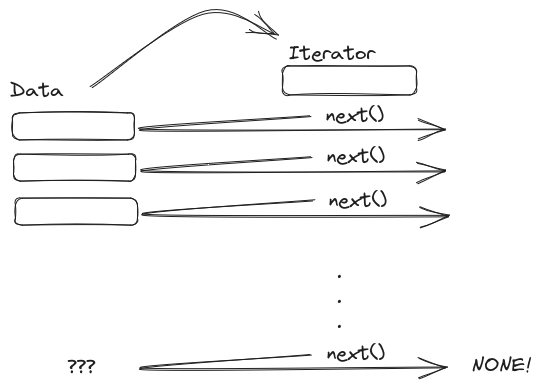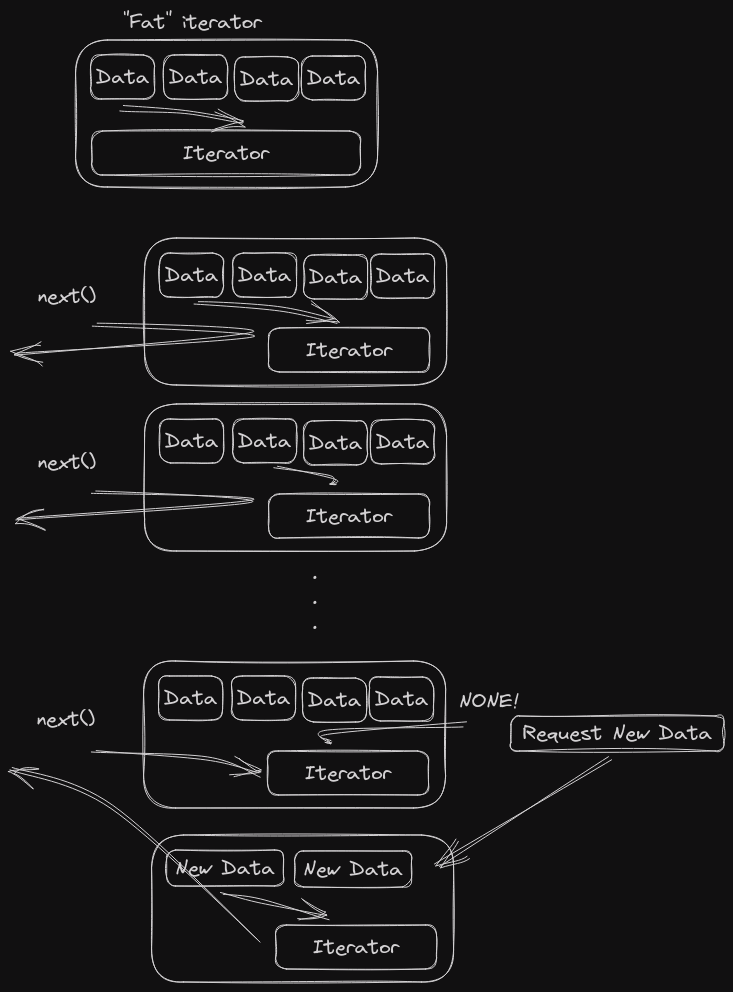Overthinking Rust Iterators
2023-07-06 #rust #iterators #request #streamI had some issue recently with Rust iterators, and that led me to think a lot about iterators in Rust.
What I wanted to do was something not exactly direct in Rust:
- The issue was an external REST API;
- The API returns the data in chunks, providing a paging mechanism;
- The API indicates that there are more data with a
nextfield, which either has the URL for the next page or an empty string if you're in the last page and there is no more data; - On my side, I wanted something akin to (which is basically an iterator, anyway)
let service = Service(connection_information);
let data = service.data(); // This provides the iterator
while let Some(record) = data.next() {
do_something(&record);
}
- The
.data()iterator would get the first page and start iterating over those results; - Once the results were all consumed, if the API informed that there is more data, the iterator (or something) would request more information, adjust itself for the new data and just keep chugging till all the data was produced.
Notice that the iterator I want have two sides: One is to spew information from previous request from memory/cache; the second is requesting (or triggering the request somewhere) for more data.
Back to Iterators
Basic iterators work like this:

... which you have a dataset, create an iterator over them and each call of
.next() on it will advance the iterator over the next element of the data and
return a reference to that data; once it reaches the end of data, it returns a
None, indicating that there are no more data.
The fun thing about iterators is that they need to hold their own state: Which
is the current element that I'm pointing to? The .next() receives a mutable
reference of self exactly due this: It changes its state on each call of
.next().
What I need is, basically, an iterator that does that and, once it sees
None, retrieves more data and starts over. This raises the question: How does
the iterator gets more data?
The Fat Iterator Approach
The idea I had was to create a fat iterator that would "hold" its own data and iterate over it.

Because the data is simply a Vec<>, I could do something like:
- Pull data from service;
- Update the
datainside the iterator; - Create a new iterator over said
data; - Call
.next()on the iterator till it turns intoNone; - If there is more data, do the request and jump to 2.
If we jump back to the fact that .next() updates the iterator internal state,
this means that I'd need to keep the data and its iterator in the same
structure. And that causes issues with the borrow checker, 'cause I can't own
part of the data when I own the whole data (yes, it feels like a problem with
the borrow check, but still).
The idea seems solid, except I'd be fighting the borrow checker to a point I'm not capable yet.
The "Request Someone Else" Iterator
The other idea I had (but couldn't figure out how it would work) was to,
instead of service.data() return an iterator, it would return the data holder
and that could create an iterator over itself. The weird thing about this is
that the iterator would have to have a mutable reference to the source data, so
it could call the parent when it reached the end of the data, and the parent
would get a new data source and the iterator would "reset itself" after calling
it -- which sounds more complex than it should.
(I could also make the parent holder have a Cell<> over data to have just
internal mutability over it, but again, sounds more complex than it should).
The Solution
Sorry, no solution (yet). I'm still tinkering with it and I'll update this once I find something that works and it doesn't require two (or more) things (mutably) interacting between themselves.